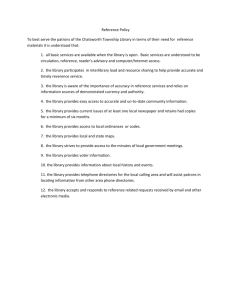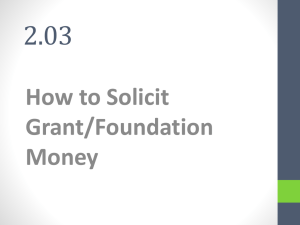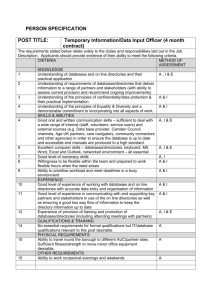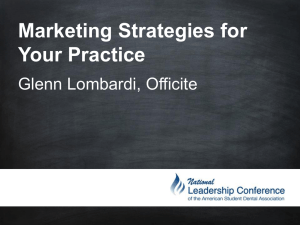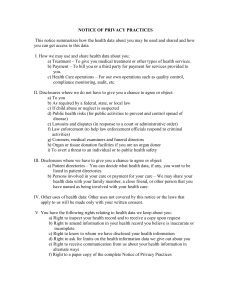Identifying Prospects - Bristol Organizations
advertisement
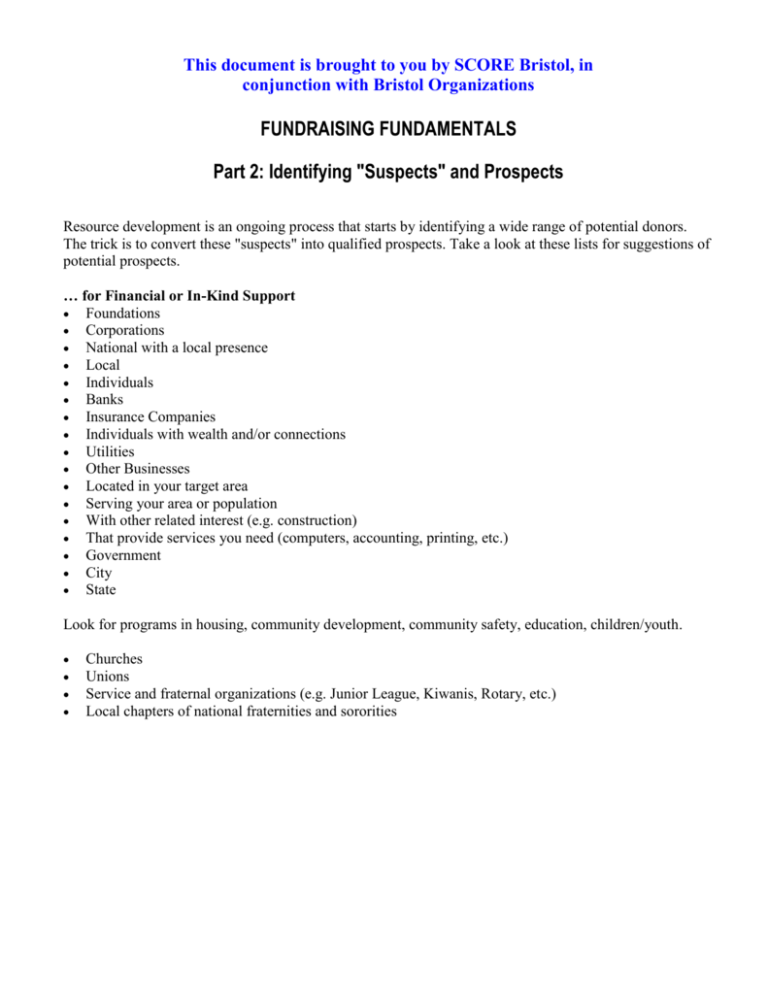
This document is brought to you by SCORE Bristol, in conjunction with Bristol Organizations FUNDRAISING FUNDAMENTALS Part 2: Identifying "Suspects" and Prospects Resource development is an ongoing process that starts by identifying a wide range of potential donors. The trick is to convert these "suspects" into qualified prospects. Take a look at these lists for suggestions of potential prospects. … for Financial or In-Kind Support Foundations Corporations National with a local presence Local Individuals Banks Insurance Companies Individuals with wealth and/or connections Utilities Other Businesses Located in your target area Serving your area or population With other related interest (e.g. construction) That provide services you need (computers, accounting, printing, etc.) Government City State Look for programs in housing, community development, community safety, education, children/youth. Churches Unions Service and fraternal organizations (e.g. Junior League, Kiwanis, Rotary, etc.) Local chapters of national fraternities and sororities … for your Board add to the above list: Elected and government officials Clergy "Alumni" of city leadership training programs Strategic partners Media executives Advertising/public relations executives Real estate Law enforcement Educators Leaders within the community/constituents served … for Strategic Partnerships Community foundations Community colleges Other colleges and universities United Way Government Business with related interests: banking, insurance, construction, utilities, health care Other nonprofit organizations. Information Resources Overview Here are some ideas of places to look to find information/research on your prospects. Board They should be leaders with their fingers on the pulse of your community, and they should be connected. Ask for their recommendations – about other board member prospects and potential funding sources. They should be the first group you approach for support. Publications Newspapers: business news, society pages, special editions (Economic Outlook, Progress editions, etc.) Business journals City magazines Book of Lists, "Blue Books" Social Register Annual reports of corporate "suspects" of other non-profits (United Way, organizations who serve a similar purpose or constituency, including your CDC’s) use their donor lists! Organizations Community foundation Chamber of Commerce and other trade or professional associations (directories) Private Industry Council Association of Area Grantmakers Minority business associations Networking: Use every opportunity to meet people, learn about their interests, talk about your work and engage their interest. Increase your organization's visibility. Attend events (groundbreakings, ribbon-cuttings, fund raisers, etc.) Social gatherings (cocktail parties, etc.) Participate in city leadership training programs. Speak to business and community groups (chambers of commerce, service or fraternal organizations, professional associations) – many have regular weekly or monthly meetings and look for speakers on community issues. Seek opportunities to participate in boards, groups formed to address critical (and relevant) community issues, etc. Be strategic – your time is limited so look for those opportunities that might give you access to business or community leaders, that convey to others that you are viewed as a community leader, by virtue of your inclusion in this group. Network with other nonprofit groups, share information about funders. Outreach to public officials – get on their mailing list, and put them on yours; visit them to brief on Enterprise; invite for tours; invite their involvement. Information Resources Research References The following are helpful reference materials to help you research corporate, foundation, and individual prospects. The Foundation Center The Foundation Center is a national organization which serves as an authoritative source of information on foundation and corporate giving. Publications include The Foundation Directory, individual guides on specific grant topics and regional grantmakers, and reference books such as Securing Your Organization's Future, A Complete Guide to Fundraising Strategies, by Michael Seltzer. The Foundation Center’s reference collections (in New York, San Francisco, District of Columbia, Atlanta and Cleveland) offer a variety of services and comprehensive collections of information. In addition to these collections, many public libraries throughout the country participate in the Foundation Center's Cooperating Collections network. For further information on services, publications and locations of cooperating collections, call 1800-424-9836. The Taft Group The Taft Group publishes the Corporate Giving Directory. This directory provides comprehensive profiles on America's major corporate foundations and corporate charitable giving programs. Indexes allow researchers to quickly find information on funders by company name, location, recipient type, or officers and directors names. The Taft Group also publishes Guide to Private Fortunes, descriptions and profiles of the wealthiest and most philanthropic individuals and families. Finally, Who Knows Who, is a helpful resource with several indexes for networking through corporate boards. State and Regional Foundation Directories State and regional foundation directories are published by a variety of sources, including private publishers, associations of area grantmakers, community foundations, volunteer centers, junior leagues, and offices of the (state) Attorney General. Government Directories Catalog of Federal Domestic Assistance. General Services Administration, Washington, D.C.: U.S. Government Printing Office. Cost: $53 (202)512-1355. Federal Register. Washington, D.C.: U.S. Government Printing Office. Published daily. Leadership Directories (Yellow Books) The Leadership Directories are a series known as the "Yellow Books," published quarterly by Leadership Directories, Inc. They include timely and accurate listings of the key executives, officers and board members of major organizations within the sectors covered by the series. For example, the Corporate Yellow Book includes leading U.S. manufacturers, service businesses, and utilities. Other recommended directories include Financial Yellow Book and Law Firms Yellow Book. Leadership Directories, Inc. has offices in New York (212-627-4140) and Washington. To order, call the New York Office. Public Library Most public libraries have on-line services as well as reference collections on private industry. The Business Dateline is one on-line service which contains abstracts of corporate press releases. These press releases contain valuable financial information as well as names of officers and current business trends. Periodicals is another on-line service providing abstracts from newspapers and magazines. Searching for specific information on individuals and corporations through these on-line services can provide excellent and timely information on prospects. The Standard & Poor's Stock Exchange Reports are an up-to-date source of financial information on publicly traded companies. Dunn & Bradstreet publishes reference books which contain parent company and subsidiary information on private companies. These reference books also list officers and board members. The Ward's Business Directory of U.S. Private and Public Companies provides financial information for hard to research privately-held companies. Hoover's Guide to Private Companies and Notable Corporate Chronologies, published by Gale Research, are two additional reference books available at public libraries. Martindale & Hubbell publishes directories profiling prominent lawyers and Who's Who in America gives descriptions of individuals and their families. Periodicals/Other Publications In addition to local newspapers and magazines, periodicals such as Forbes, Fortune, Wall Street Journal, New York Times, Chronicle of Philanthropy, Corporate Giving Watch, and Foundation & Corporate Grants Alert are examples of the many publications which contain valuable information for grantseekers. An inexpensive ($10), comprehensive resource providing extensive on-line and prospect research information is Bibliography: Resources for Prospect Development 1996-97 published by Bentz Whaley Flessner & Associates, Inc. Children & Youth Funding Report. CD Publications, Silver Spring, Md. Annual Subscription: $259. Published twice monthly. (301)588-6380. The Chronicle of Philanthropy. Washington, D.C. Annual Subscription: $67.50. Published biweekly. Federal Assistance Monitor. CD Publications, Silver Spring, Md. Annual Subscription: $259. Published twice monthly. (301)588-6380. Federal Grants & Contracts Weekly. Capitol Publications, Inc., Alexandria, Virginia. Annual Subscription: $379. (800)655-5597. Foundation & Corporate Grants Alert. Capitol Publications, Inc., Alexandria, Virginia. Annual Subscription: $269. Published monthly. (800)655-5597. The Grantsmanship Center Magazine. The Grantsmanship Center, Los Angeles, California. Free to nonprofit and government agencies. The NonProfit Times. Davis Information Group, Inc., Cedar Knolls, N. J. Annual Subscription: $59. Free to Published monthly. (201)734-1700. IRS Forms All private foundations must file a tax return with the IRS. This becomes public information. Form 990 provides valuable information such as: assets: grants paid, officers, application information, and grants approved for future payment. Complete or regional sets of IRS forms are available at Foundation Center collection locations, through district IRS offices, and in some states through the State Attorney General’s office or Secretary of State. Annual Reports Once you have targeted a corporation or foundation as a prospect, call for an annual report. These reports are sent free of charge and contain mission statements, business trends, financials, and listings of officers, directors and trustees. Larger corporations typically produce a for-profit annual report as well as a philanthropic annual report. Each provides the kinds of information that can be used to match funder to recipient. Annual Reports give details on who is being funded, what programs are receiving money and where the donor is concentrating philanthropic efforts. Phone Calls The public relations or investor relations departments of many companies will fax you current press releases on mergers and acquisitions, biographies, and current business trends. Privately-held companies are not as forthcoming with information, but in some cases they will provide basic information about the company. Phone numbers and addresses can be found in the previously recommended yellow book listed under Leadership Directories. Some electronic prospecting tools include: Catalog of Federal Domestic Assistance, Orca Knowledge Systems: San Anselmo, California. Cost: $149 (800)868-ORCA. Chronicle of Philanthropy Guide To Grants, Washington, D.C. Cost: $295. FC Search, The Foundation Center’s Database on CD-ROM, Cost: $1,195. The Grants Database, Oryx. Cost: $1,000. GrantSearch CFDA, Capitol Publications, Inc., Alexandria, Virginia. Cost: $375 (800)655-5597. Prospector's Choice. Washington, D.C.: The Taft Group. Cost: $895. Sources of U.S. Foundations, Orca Knowledge Systems: San Anselmo, California. State Version: $129, Regional Version $179, National Version: $359 (800)868-ORCA. Online Resources Please consult the Web Resources Section of Enterprise MoneyNet for links to useful online resources. Information Resources State and Regional Foundation Directories The Foundation Center The Foundation Center is a national organization which serves as an authoritative source of information on foundation and corporate giving. Publications include The Foundation Directory, individual guides on specific grant topics and regional grantmakers, and reference books such as Securing Your Organization's Future, A Complete Guide to Fundraising Strategies, by Michael Seltzer. The Foundation Center’s reference collections (in New York, San Francisco, District of Columbia, Atlanta and Cleveland) offer a variety of services and comprehensive collections of information. In addition to these collections, many public libraries throughout the country participate in the Foundation Center's Cooperating Collections network. For further information on services, publications and locations of cooperating collections, call 1800-424-9836. The Taft Group The Taft Group publishes the Corporate Giving Directory. This directory provides comprehensive profiles on America's major corporate foundations and corporate charitable giving programs. Indexes allow researchers to quickly find information on funders by company name, location, recipient type, or officers and directors names. The Taft Group also publishes Guide to Private Fortunes, descriptions and profiles of the wealthiest and most philanthropic individuals and families. Finally, Who Knows Who, is a helpful resource with several indexes for networking through corporate boards. State and Regional Foundation Directories State and regional foundation directories are published by a variety of sources, including private publishers, associations of area grantmakers, community foundations, volunteer centers, junior leagues, and offices of the (state) Attorney General. Government Directories Catalog of Federal Domestic Assistance. General Services Administration, Washington, D.C.: U.S. Government Printing Office. Cost: $53 (202)512-1355. Federal Register. Washington, D.C.: U.S. Government Printing Office. Published daily. Leadership Directories (Yellow Books) The Leadership Directories are a series known as the "Yellow Books," published quarterly by Leadership Directories, Inc. They include timely and accurate listings of the key executives, officers and board members of major organizations within the sectors covered by the series. For example, the Corporate Yellow Book includes leading U.S. manufacturers, service businesses, and utilities. Other recommended directories include Financial Yellow Book and Law Firms Yellow Book. Leadership Directories, Inc. has offices in New York (212-627-4140) and Washington (202-347-7757). Public Library Most public libraries have on-line services as well as reference collections on private industry. The Business Dateline is one on-line service which contains abstracts of corporate press releases. These press releases contain valuable financial information as well as names of officers and current business trends. Periodicals is another on-line service providing abstracts from newspapers and magazines. Searching for specific information on individuals and corporations through these on-line services can provide excellent and timely information on prospects. The Standard & Poor's Stock Exchange Reports are an up-to-date source of financial information on publicly traded companies. Dunn & Bradstreet publishes reference books which contain parent company and subsidiary information on private companies. These reference books also list officers and board members. The Ward's Business Directory of U.S. Private and Public Companies provides financial information for hard to research privately-held companies. Hoover's Guide to Private Companies and Notable Corporate Chronologies, published by Gale Research, are two additional reference books available at public libraries. Martindale & Hubbell publishes directories profiling prominent lawyers and Who's Who in America gives descriptions of individuals and their families. Periodicals/Other Publications In addition to local newspapers and magazines, periodicals such as Forbes, Fortune, Wall Street Journal, New York Times, Chronicle of Philanthropy, Corporate Giving Watch, and Foundation & Corporate Grants Alert are examples of the many publications which contain valuable information for grantseekers. An inexpensive ($10), comprehensive resource providing extensive on-line and prospect research information is Bibliography: Resources for Prospect Development 1996-97 published by Bentz Whaley Flessner & Associates, Inc. Children & Youth Funding Report. CD Publications, Silver Spring, Md. Annual Subscription: $259. Published twice monthly. (301)588-6380. The Chronicle of Philanthropy. Washington, D.C. Annual Subscription: $67.50. Published biweekly. Federal Assistance Monitor. CD Publications, Silver Spring, Md. Annual Subscription: $259. Published twice monthly. (301)588-6380. Federal Grants & Contracts Weekly. Capitol Publications, Inc., Alexandria, Virginia. Annual Subscription: $379. (800)655-5597. Foundation & Corporate Grants Alert. Capitol Publications, Inc., Alexandria, Virginia. Annual Subscription: $269. Published monthly. (800)655-5597. The Grantsmanship Center Magazine. The Grantsmanship Center, Los Angeles, California. Free to nonprofit and government agencies. The NonProfit Times. Davis Information Group, Inc., Cedar Knolls, N. J. Annual Subscription: $59. Free to Published monthly. (201)734-1700. IRS Forms All private foundations must file a tax return with the IRS. This becomes public information. Form 990 provides valuable information such as: assets: grants paid, officers, application information, and grants approved for future payment. Complete or regional sets of IRS forms are available at Foundation Center collection locations, through district IRS offices, and in some states through the State Attorney General’s office or Secretary of State. Annual Reports Once you have targeted a corporation or foundation as a prospect, call for an annual report. These reports are sent free of charge and contain mission statements, business trends, financials, and listings of officers, directors and trustees. Larger corporations typically produce a for-profit annual report as well as a philanthropic annual report. Each provides the kinds of information that can be used to match funder to recipient. Annual Reports give details on who is being funded, what programs are receiving money and where the donor is concentrating philanthropic efforts. Some electronic prospecting tools include: Catalog of Federal Domestic Assistance, Orca Knowledge Systems: San Anselmo, California. Cost: $149 (800)868-ORCA. Chronicle of Philanthropy Guide To Grants, Washington, D.C. Cost: $295. FC Search, The Foundation Center’s Database on CD-ROM, Cost: $1,195. The Grants Database, Oryx. Cost: $1,000. GrantSearch CFDA, Capitol Publications, Inc., Alexandria, Virginia. Cost: $375 (800)655-5597. Prospector's Choice. Washington, D.C.: The Taft Group. Cost: $895. Sources of U.S. Foundations, Orca Knowledge Systems: San Anselmo, California. State Version: $129, Regional Version $179, National Version: $359 (800)868-ORCA. Online Resources Please consult the Web Resources Section of Enterprise MoneyNet for links to useful online resources. Information Resources- Foundation Definitions Below, you will find definitions for the types of foundations that are your prospects. Community Foundations: Funded by many sources who want their contribution to benefit a particular city or region. These foundations often serve as trustee or manager for smaller family or individual trusts. Board of trustees usually represents broad sector of the community. Specific city or region Priorities are based on local needs Usually award smaller grants Often favor seed funding to start new programs Good source of information about the community, especially the philanthropic community Often serve as facilitators for community problem-solving, coalition and partnership builders Independent Foundations: Also known as private foundations. Usually funded or endowed by a single source, such as an individual or family, from inherited wealth or wealth accumulated through business activity. May be large multipurpose; special purpose; and/or family foundation. Support may be limited to special purposes designated by the founder Tend to have specified grant making interests. Large foundations usually publish guidelines Larger ones may have program officers on staff responsible for designated program areas, reviewing related proposals and making recommendations to trustees Family foundations tend to have few if any staff. Family members are generally very involved and dominate the board of directors Family foundations tend to limit support to very specific special purposes. They often favor religious causes and higher education Different branches or members of the same family may establish their own foundations with distinct interests. Operating Foundations: Established by a non-profit to fund its own programs. External grants are seldom awarded. Company Foundation: Funded by profit-making entity for the purpose of charitable giving. Not all companies and corporations establish foundations; contributions may be made directly by the company, even if they also have a foundation. Typically give a large number of small grants Usually limit giving to area of operation Usually give for a broad spectrum of interests. Priorities are often in areas of interest to the company (such as community projects near company facilities; to organizations serving employee needs; for research or projects related to company products or services.) Legal entity separate from the sponsoring company, has own board of directors. Information Resources - Corporate Research Checklist When doing research on a corporate prospect, this checklist can guide your efforts. Who is responsible for their corporate giving? Corporate Foundation Community/Public Affairs Committee Other __________________________________ Do they publish guidelines? What are the geographic limitations to their giving? What are their priorities? What are the criteria? Do they have a budget and if so, when is it determined? Do they have a deadline by which all decisions related to contributions for the year are made? Is preference given to organizations which serve employees’ needs? involve employee volunteers? How to apply for funding? Past giving history. Officers of company and trustees - any connections to your organization? Tip: After resourcing the prospect, if there is a fit with your organization, leverage these opportunities to develop a strategy on how best to approach them. Information Resources Creative Research on Individuals Here are some suggestions of where to go to look for the following information: Name Telephone directories; state or county office of identification; voter’s registration office; county office of births and deaths; department of motor vehicles; post office; telephone company; tax assessor’s office; biographic references; checks; letterhead. Address Telephone directories; post office; telephone company; other public utilities; tax assessor’s office; city directories; social register; department of motor vehicles; letterhead; checks. Telephone Numbers Telephone directories (white and yellow pages); letterhead or personal stationery; city directories; biographic reference sources such as Who’s Who series; social register; club membership rosters. Marital Status Records office for marriage licenses; motor vehicle registration office; property assessor’s office; tax assessor’s office; property records office; court files on divorce proceedings; probate records; correspondence files; checks. Date of Birth/Death County records office for births, deaths and marriages; obituaries; Who’s Who series; newspaper articles; motor vehicle registration; passport; applications to school; organizational membership office. Indicators of Worth: Home Value County property appraiser’s office; tax assessor’s office; public library. Ownership of Property Tax poll; property records office; real estate brokers. Stockholdings (for insiders, directors and 5% owners): proxy statement; official summary of Security Transactions and holdings; Investment; newspaper columns on insider trading and profiles on public companies. Alimony/child support Newspaper articles; court records. Ownership of boats, yachts Newspaper articles; social register; Lloyd’s Register of Yachts, shipping; yacht brokers and boat sales (for value). Value of autos Blue books; car dealers; newspapers; department of motor vehicles for registration and liens. Art collection Newspaper articles; museums; art galleries Inheritance/Trust income Public relations department of company; Who’s Who; resume. Career History Resume; Who’s Who; social register; newspaper articles; can be verified by calling institution; professional directories and state licensing boards. Education Newspaper articles; membership lists; event programs; Who’s Who; social register. Interests Research, hobbies, and other interests While you are not likely to become involved in this level of prospect research, you might find some of this information of value in researching or screening a major individual prospect. It should also be interesting to see how much information is available to the public with a little digging. Screening and Rating Prospects - 4 Steps Once you have identified your prospects, there are four steps in rating them to determine the ones with the best fit/opportunity to support your organization. Step One: First Cut Test Do they fund within my geographic area? yes no Does our work fit within their priorities and statement of purpose? yes no Do they support organizations with similar purposes? yes no Step Two & Step Three: Factors in Rating Prospects Capability What are the foundation’s or individual’s assets? How financially sound is the corporation or business? Total contributions last reporting period Size of average grant Potential for in-kind donation of goods/services Potential for strategic partnership Relationship Has supported your organization in the past, locally or nationally There is a relationship between the individual or an officer/director of the foundation or corporate prospect and your organization (you, a national board member/or officer, advisory board member) Related business interest. Located in neighborhood being served or otherwise serves your constituency Involvement Actively involved as a board member or volunteer Inclination Active in philanthropy Has donated to organization with compatible mission or serving similar constituency Guidelines indicate priorities include housing poverty community development other related programs Step Four: Develop Cultivation Plan Once you have done your prospect research and have identified your best prospects, you need to develop a plan to cultivate them to give to your organization. This can be a long process- but It's worth the wait! A simple rule of thumb for cultivating prospects is: The Five Is Investment Involvement Interest Information Identification (Prospecting)
